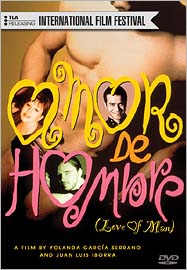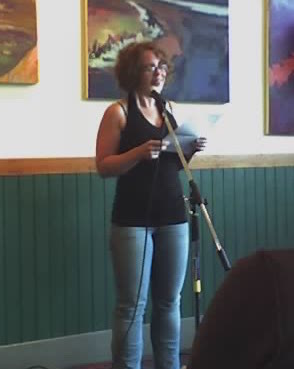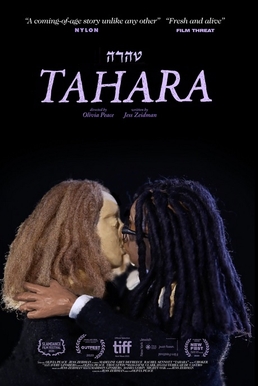
Clase 406 is a Mexican telenovela produced by Pedro Damián for Televisa, broadcast by Canal de las Estrellas. It is a remake of the Colombian telenovela Francisco, El Matemático (1999). Clase 406 originally aired from Monday, July 1, 2002, to Friday, October 31, 2003. The story deals with the problems of newer Latino youth, in general like sex, drug dealing, abuse, drinking, rape, deception, and heartbreak.

Loving Annabelle is a 2006 American romantic drama film written and directed by Katherine Brooks. Inspired by the 1931 German film Mädchen in Uniform, it tells the story of a boarding school student who falls in love with her teacher.

Amor de hombre is a 1997 Spanish gay-themed drama film directed by Yolanda García Serrano and Juan Luis Iborra. An intimate, warm and tender Spanish film about the very close friendship between a gay man and a straight woman.

Meliza Bañales is an American writer, performer, and slam poet. She has lived in the San Francisco Bay Area, Santa Cruz, and Los Angeles.

Pariah is a 2011 American drama film written and directed by Dee Rees. It tells the story of Alike, a 17-year-old Black teenager embracing her identity as a lesbian. It premiered at the 2011 Sundance Film Festival and was awarded the Excellence in Cinematography Award.
Aurora Guerrero is a writer-director from California.

Yosimar Reyes is a Mexican-born poet and activist. He is a queer undocumented immigrant who was born in Guerrero, Mexico and raised in East San Jose, California. Reyes has been described as "a voice that shines light on the issues affecting queer immigrants in the U.S. and throughout the world."
Latin American nations have been producing national LGBT+ cinema since at least the 1980s, though homosexual characters have been appearing in their films since at least 1923.:75 The collection of LGBT-themed films from 2000 onwards has been dubbed New Maricón Cinema by Vinodh Venkatesh; the term both includes Latine culture and identity and does not exclude non-queer LGBT+ films like Azul y no tan rosa.:6-7 Latin American cinema is largely non-systemic, which is established as a reason for its wide variety of LGBT-themed films.:142
Wu Tsang is a filmmaker, artist and performer based in New York and Berlin, whose work is concerned with hidden histories, marginalized narratives, and the act of performing itself. In 2018, Tsang received a MacArthur "genius" grant.

Jackie Cruz is a Dominican–American actress, singer and former model. She is known for her role as Marisol "Flaca" Gonzales on the Netflix original series Orange Is the New Black.

La señora de Cárdenas is a Venezuelan telenovela written by José Ignacio Cabrujas and produced by RCTV in 1977. The telenovela became the first in a series of telenovelas referred to as the cultural telenovela because they reflected the reality of Venezuelans in areas such as marriage and intimate family life.

Suicide Kale is a 2016 American dark comedy film, directed by Carly Usdin and written by Brittani Nichols. The film centers on Jasmine and Penn, a lesbian couple who unexpectedly find a hidden suicide note in the home of their friends Billie and Jordan. The film premiered at the Queer Hippo International LGBT Film Festival in Houston, Texas on April 3, 2016. Usdin won the Audience Award for Best First U.S. Dramatic Feature at 2016 Outfest.
Brittani Nichols is an American producer, actress, comedian, and writer. In 2016, Nichols wrote, produced, and starred in the film Suicide Kale, which won the Audience Award for Best U.S. Dramatic Feature at 2016 Outfest. She has written for the television programs A Black Lady Sketch Show, Take My Wife, Strangers, Drop the Mic, and Abbott Elementary. She served as Consulting Producer for The Circle and Getting Curious with Jonathan Van Ness.
Carly Usdin is an American director, writer, and producer. Usdin is best known for directing the 2016 film Suicide Kale and co-creating the comic book series Heavy Vinyl with Nina Vakueva. In 2019, they received the Jury Prize for Best Director for the short film Misdirection at the Los Angeles Diversity Film Festival.
There are many Mexican LGBT+ films, a genre that has developed through the film history of the country since the 1970s.
Fenessa Pineda is an American-Mexican actress. She is best known for Rambo: Last Blood (2019), Mosquita y Mari (2012) and Sin Cielo (2018).

Magical Girl Friendship Squad is an American adult animated magical girl sitcom created by Kelsey Stephanides and starring Anna Akana and Quinta Brunson. It follows two directionless young women who must figure out how to save the Universe. The first season of the series, consisting of six 11-minute episodes, premiered on Syfy's late night programming block TZGZ on September 26, 2020.
In the 2020s, LGBTQ representation in animated series and animated films became more pronounced than it had in the 2010s, or 2000s when it came to Western animation. This included series like The Owl House, Harley Quinn, Adventure Time: Distant Lands, RWBY, and Dead End: Paranormal Park. Series like She-Ra and the Princesses of Power, Steven Universe Future, The Hollow, and Kipo and the Age of Wonderbeasts, which had various LGBTQ characters, came to an end in 2020, and Gen:Lock came to an end in 2021. An upcoming season of Hazbin Hotel was hinted at, while an animated adaption of Lumberjanes was in development.
Dalila Paola Méndez, is an American visual artist of Guatemalan/Nicaraguan/Salvadoran descent.

Tahara is a 2020 American drama film directed by Olivia Peace and written by Jess Zeidman. It premiered at the 2020 Slamdance Film Festival and was released to wide audiences on June 10, 2022. Tahara received awards from Outfest, Newfest, and the Denver International Film Festival.











